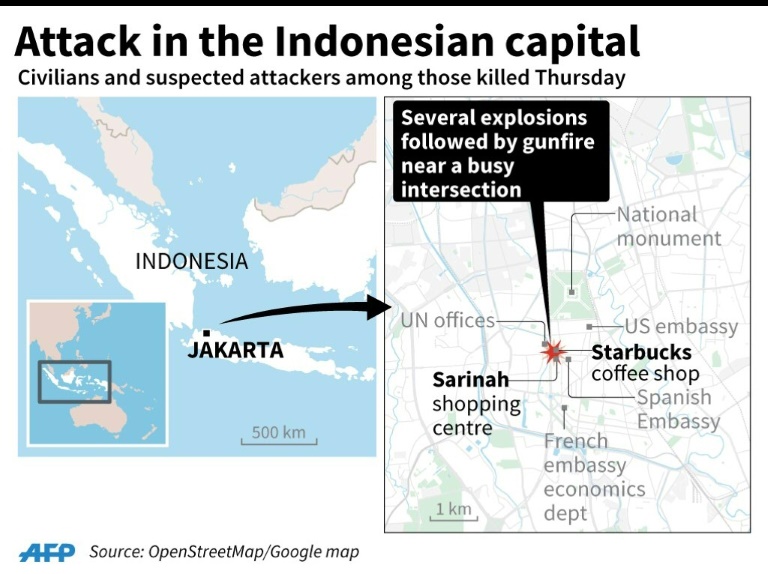Jakarta attacks confirms regional fears over IS: Analysts
 |
| Armed Indonesian police arrive at the site of gun and suicide bomb attacks outside a Starbucks coffee shop in central Jakarta on Jan 14, 2016. (Photo: AFP/Romeo Gacad) |
JAKARTA: A "Paris-style" suicide strike on the Indonesian capital on Thursday (Jan 14) confirmed Southeast Asian governments' worst fears - that citizens returning from fighting alongside the Islamic State group in the Middle East could launch attacks at home.
Regional nations have been warning for months of the possibility of attack, mirroring concerns expressed by European authorities fearful of the intentions of people returning home from conflict.
The blasts and gunfire that rocked Jakarta came after six years of relative calm, following a government crackdown that weakened the country's most dangerous homegrown Islamic networks.
"We know that (IS) has the desire to declare a province in this region and there are groups in this region ... that have pledged allegiance to (IS)," said Kumar Ramakrishna, an expert on Southeast Asian militant groups at Nanyang Technological University in Singapore.
"The threat of returning Southeast Asian fighters radicalised in the Iraq/Syria region (is) also another factor of concern, together with the possibility of self-radicalised lone wolves appearing in the scene."
"Based on social media accounts, there seems to be a degree of coordination and a fair bit of sophistication in the attacks. This is not a lone wolf attack, it's planned. Significant planning was involved," said Mr Ramakrishna.
Thursday's attacks left five attacks and two civilians, including a Westerner, dead and 19 others wounded.

National police spokesman Anton Charliyan told AFP that authorities had a "strong suspicion" an IS-linked group carried out the assault and that it was designed to replicate the November strike on Paris that claimed 130 lives.
Although the toll was much lower, the selection of soft targets in the heart of the capital terrified citizens, and social media erupted with disturbing images and video footage, and the hashtag #KamiTidakTakut (We are not afraid).
FIGHTERS RETURN
The strike was launched just weeks after Indonesia issued a heightened alert and arrested several suspected militants, some of them from IS-linked cells.
The Soufan Group, a New York-based security consultancy, says that of the 500-700 Indonesians who travelled abroad to join IS's self-proclaimed caliphate across swathes of Syria and Iraq, scores have since returned. The threat posed by returning foreign fighters is not a new one for Indonesia.
The country's counter-terror chief has recalled that Indonesians who trained with Islamic militants in Afghanistan in the 1990s came back and launched terror attacks, including the 2002 Bali bombings.
Indonesia, the world's most populous Muslim-majority nation, launched a crackdown that neutered the networks, and attacks in recent years have mostly been low-level and have targeted domestic security forces.
More recently, the country has banned support for IS and its ideology, but experts worry that Indonesian laws are not adequate for tackling the new threat and that the region is failing to pull together.
"The governments in this region must work together to prevent the creation of a satellite of the caliphate because if such a satellite is declared, the threat in Southeast Asia will grow," said regional terrorism expert Rohan Gunaratna.
"There are groups based both in Indonesia and the Philippines that have pledged allegiance to IS and those groups must be dismantled."
Indonesia and Southeast Asia have also been a target for Al-Qaeda, with the terror network's chief Ayman al-Zawahiri calling for a regional "battle" in remarks released this week.
Addressing Muslims in Indonesia, the Philippines, Malaysia and neighbouring countries, Zawahiri said the region's Muslims were "leading an ideological and political battle against the seculars and the enemies of the religion".
One strategy being deployed by Indonesia's counter-terror chiefs is to leverage a handful of former IS members who have returned from the Middle East disenchanted with their experiences.
They are looking to publicise their stories of misery and disappointment - at the hands of a militant leadership which gave them little respect or responsibility - in a bid to deter potential recruits. But the threat is unlikely to dissipate.
"Indonesia has faced a rising threat of this kind of terrorist attack over the past year," said Hugo Brennan, an Asia analyst Verisk Maplecroft. "The warning signs have been there for all to see."
What the stars mean:
★ Poor ★ ★ Promising ★★★ Good ★★★★ Very good ★★★★★ Exceptional
Latest News
More News
- Russian President congratulates Vietnamese Party leader during phone talks (January 25, 2026 | 09:58)
- Worldwide congratulations underscore confidence in Vietnam’s 14th Party Congress (January 23, 2026 | 09:02)
- Political parties, organisations, int’l friends send congratulations to 14th National Party Congress (January 22, 2026 | 09:33)
- 14th National Party Congress: Japanese media highlight Vietnam’s growth targets (January 21, 2026 | 09:46)
- 14th National Party Congress: Driving force for Vietnam to continue renewal, innovation, breakthroughs (January 21, 2026 | 09:42)
- Vietnam remains spiritual support for progressive forces: Colombian party leader (January 21, 2026 | 08:00)
- Int'l media provides large coverage of 14th National Party Congress's first working day (January 20, 2026 | 09:09)
- Vietnamese firms win top honours at ASEAN Digital Awards (January 16, 2026 | 16:45)
- ASEAN Digital Ministers' Meeting opens in Hanoi (January 15, 2026 | 15:33)
- ASEAN economies move up the global chip value chain (December 09, 2025 | 13:32)
















 Mobile Version
Mobile Version